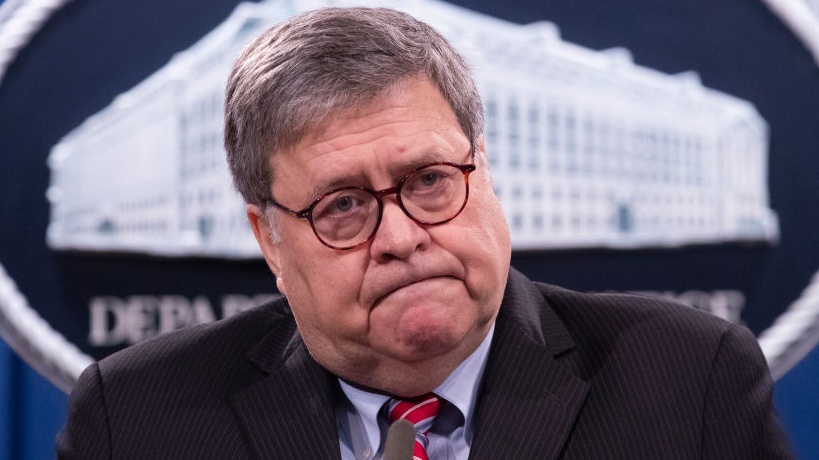The New York Times has reported that former Attorney General William Barr considered, and eventually denied, a deal from Minneapolis officer Derek Chauvin that would have seen him plead guilty to third-degree murder just three days after he killed
George Floyd on video last year.
According to the newspaper, Chauvin believed the Memorial Day video of him kneeling on Floyd's neck for 9 minutes was so damning that he was better off accepting a quick plea in exchange for an agreement that federal civil rights charges would not be launched against him and that he could serve his time in federal prison.
The deal, which reached the attorney general's office just three days after Chauvin killed Floyd, was eventually shot down by Barr because he allegedly worried the protests, which had already started at that point, would grow more ferocious if people thought the government accepted a relatively light sentence for Chauvin.
The Minneapolis officer was willing to spend about 10 years in prison under the deal, and officials told The New York Times that it was so close to being approved that a press conference to announce it was being planned before Barr rejected it.
It is unclear how Chauvin was able to even negotiate a deal like this just days after killing someone and officials have not explained why they were allegedly willing to accept such a deal before any investigation was done or trial was held.
Local officials told The New York Times that they hoped the deal would end the protests, but once the deal made it to Barr's desk he took a different stance, questioning why a plea deal would be struck just days after the crime was committed.
The deal had to be run by Barr because Chauvin wanted to serve his time in federal prison and because he wanted no federal civil rights charges lodged against him. Barr allegedly wanted state officials to take over the case first and make their own assessment before anyone else stepped in, according to officials who spoke to The New York Times.
Keith Ellison, Minnesota’s attorney general, is now leading the prosecution.
The eye-opening revelations come just a few weeks before Chauvin's trial starts. After initially being slapped with third-degree murder charges, prosecutors changed it to second-degree murder and second-degree manslaughter charges.
Jury selection for the trial begins on March 8 but it is already causing concern among state officials who worry about protests and potential violence if Chauvin is not convicted. There are already worries that the trial may attract white supremacist violence akin to what was seen on Jan. 6, according to state officials who spoke to The New York Times.
Ellison has already expressed concerns about the fact that Chauvin's case has been separated from the that of the three other officers involved in Floyd's killing. Instead of trying all four at the same time and tacitly forcing Thomas Lane, J. Alexander Kueng and Tou Thao to turn on Chauvin, the separated trials may help both sides.
The New York Times noted that if Chauvin is acquitted, the other three officers will likely be let off as well, making them more likely to help Chauvin's lawyers.
Attorney's for Chauvin have already caused controversy by demanding the court ban people from calling Floyd a victim, according to the Minneapolis Star-Tribune.
Eric Nelson, Chauvin's lawyer, has also made a number of filings indicating that he plans to make Floyd's drug use the central part of his case against the charges, arguing that Floyd died because of the fentanyl and methamphetamine in his body and not from the knee that was held down on his neck for 9 minutes.
The county medical examiner caused outrage last year when they wrote that Floyd died from a "combination" of Chauvin's knee, the drugs in his system and heart problems he may have had. Despite the drugs in his system and his health issues, the county medical examine still ruled Floyd's death a homicide.
“This is the most famous police brutality prosecution in the history of the United States,” Paul Butler, a Georgetown University professor and former prosecutor told The New York Times.
“A lot of the defense strategy will look like a trial of George Floyd’s character,” he added.
